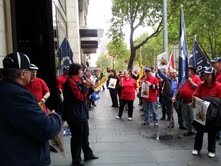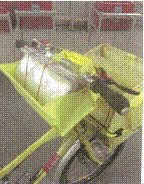Postal e-Bulletin 2013 - #10
- Latest on the EBA
- Australia Post fails to deliver
- On ROM
- Australia Post van drivers delivering stock to retail post offices (again)
- Mr & Mrs Safety initiative in Victorian parcel centre
- New letter bundle carrier with unaddressed mail pouch
- Wage gap will widen after disappointing decision by Fair Work Commission
- Australian unions launch campaign for a better life for workers and their families
- Royal Mail positioned to benefit from online retailing growth
1. Latest on the EBA
A separate EBA circular is out now. The circular can be found on www.eba8.com.au or down load our phone app below.
2. Australia Post fails to deliver

Last financial year Australia Post made an after-tax profit of $281 million. It paid the federal government a $213 million dividend.
However up to one third of postal workers who sort and delivery mail or work in retail outlets are employed on a part-time or casual basis and barely earn more than the poverty line. At the same time, the numbers of highly paid management workers in AP being paid $150,000 or more a year has grown. CEO Ahmed Fahour gets $3 million a year. In fact he is Australia’s highest paid public servant - being paid more than Reserve Bank of Australia boss or the Prime Minister Julia Gillard!
Australia Post also intends to spend $2 billion on technology and equipment etc. This new technology is likely to put more workers out of jobs. ‘Post has fewer staff now than it did when Fahour took the reins – 33,000 compared with 35,000 – and there is the strong prospect of more job losses, although the company won’t say how many. There is another five years of trying to work out what the organisation is going to look like and how many people we need in that world, but there will be a lot less.’ (Extract from Financial Review June 2013, Volume 14.)
Postal workers have suffered real wage cuts for the past three years, with pay-rises of only 2% in December 2010, 1.5% in December 2011 and 1.5% in December 2012 since the last EBA was signed off in October 2010. Now yet again postal workers and their families are expected to continue to struggle to make ends meet.
3. On ROM
The CWU has been in FWC many times this year to try to resolve differences with Australia Post about how to reach an agreement on the future staffing models as part of the Retail Services Transformation Agreement (RSTA). We have argued that data collection methods are an important part of this process. Our initial proposal was to scrap the current ROM system and the MODAPTS time standards which are used as part of that system. To assist in progression of the dispute we agreed to examine modification of these tools. AP initially was not prepared to consider modifications to these tools but later agreed to incorporate elements of the CWU’s proposed Workload Assessment Tool into the ROM survey tools and to establish a joint working party to address concerns about ROM and to allow PMs greater input into the system to determine their staffing requirements.
The working party (referred above) has been meeting regularly to review the counter and back office surveys, including the times currently in the system. We have also been reviewing the ROM reference and guidance material for PMs and PSOs. Our first aim is to develop better survey tools that identify all the tasks that are required to be captured in the counter and back office surveys and ensure the surveys developed to record the time taken to perform tasks are easy to complete. Secondly, we are aiming to change some of the default times in the system to be more typical of how long it really takes to perform tasks, such as OHS. Thirdly, we are changing the ROM reference and guidance material to make it clear that ROM times are suggested times only and that all back office and counter times produced by ROM must be validated against actual times. Ideally, PSOs wouldn’t be expected to self-time while serving customers but, putting that aside for the time being, there is really one big lesson from our work on the working party – PMs and PSOs must take back control of the data used to determine staffing in their Post Office if we are to get better outcomes.
We expect to be in a position to trial the new survey forms being developed by the working party shortly. If you and your colleagues would be interested in trialling the new surveys in your Post Office contact us on cwu@cwu.org.au.
4. Australia Post van drivers delivering stock to retail post offices (again)
Australia Post has advised the National Business Hub Consultative Committee that the trial program in Victoria having corporate Van drivers deliver stock to Retail Post Offices has been very successful.
This initiative will now roll out across other States. In the future this will assist in maximising full-time permanent positions for Van drivers. Years ago Transport drivers did this work but it was taken off them.
5. Mr & Mrs Safety initiative in Victorian parcel centre
Australia Post has trialled a safety program in Melbourne where they have cardboard cut-outs of two people, Mr & Mrs Safety to promote safe working messages.
Also, the cut-outs are placed at or near where an incident has occurred, warning employees of a possible hazard or advising them that an incident has occurred there and the nature of the incident.
AP has advised the union that the initiative has been popular with employees. The local safety committee also provides safety messages to put in the "balloon" areas on the cut-outs. There have been no reports of the cut-outs going missing or planking in the facility either.
6. New letter bundle carrier with unaddressed mail pouch

During the trial PDOs refined the bag so it would not impede on the handlebars and would have limited bumping and rubbing on the knees.
The order number for the bag is: Procurement Item No 9961920 - AP - EMB Front Letter Carrier with UMS Holder.
7. Wage gap will widen after disappointing decision by Fair Work Commission
Last week’s decision by the Fair Work Commission to raise the minimum wage by just $15.80 a week is a very poor outcome which will see 1.5 million low-paid workers and their families fall further behind.
The ACTU had sought a moderate and affordable increase of $30 a week for the lowest paid, and 4.2% for people employed above the tradesperson rate. After tax, today’s decision will give those on the minimum wage just $1.80 more a day!
“This decision is a kick in the guts for 1.5 million low-paid workers and their families that will only further widen the gap between the low-paid and average earnings,” said ACTU Secretary Dave Oliver.
“On top of that, Australia has had its best year of productivity growth in a decade, and yet again, low paid workers have nothing to show for that. With Australia’s economy in good shape, this was the year to take action to establish a decent minimum wage which would help prevent the emergence of a US-style working poor,” he said.
Mr Oliver said low-paid workers deserved recognition for their contribution to the economy. Minimum wage workers have little bargaining power, and the annual wage case is often their only chance for a pay rise.
8. Australian unions launch campaign for a better life for workers and their families

Under the banner, Australian Unions, Join. For a better life unions are highlighting the role we continue to play standing up for the basic rights at work that Australians have always enjoyed.
The ads were drawn from the everyday experiences of working Australians. They show Australians in situations which are all too common for many workers.
“Missing out on an important moment in a child's life, being unable to get a loan from a bank, and being unable to say anything about a problem at work because their employer has too much power, and an individual without support has too little,” said ACTU Secretary, Dave Oliver. “That’s why unions are standing up for a better life for all workers and their families,” he said.
Joining a union is a positive step that we need to ask more Australians to take so that we can improve the conditions that they have at work and the lives they enjoy outside of work. Union members have someone in their corner when these issues arise, as well as someone to fight for better pay and conditions, said Mr Oliver.
Mr Oliver said, “Unions have pushed for parental leave, rises to the minimum wage and are fighting to protect penalty rates which are under concerted attack from employers.”
Australian unions have more than 1.8 million members in every sector of the workforce, but are relevant to millions more, with up to 42 per cent of workers having their pay and conditions determined by a union negotiated collective agreement, and another 16 per cent who rely on an award wage.
9. Royal Mail positioned to benefit from online retailing growth
UK online-only e-retailing businesses in the UK has more than doubled in the past five years as entrepreneurs choose to invest in companies that sell goods online to create successful businesses.
Royal Mail’s position as the UK’s Universal Service Provider, alongside its extensive networks means that it is well placed to benefit from the rapidly growing parcels market.
Nick Landon, Managing Director of Royal Mail Parcels said: “Online-only e-retailing has become an increasingly strong area for business start-ups and is making a strong contribution to overall UK economy. With continued growth in online shopping, we can expect more significant contributions to the UK economy in the coming years.”
The expanding parcels market is at the centre of Royal Mail’s growth strategy. Parcels already account for nearly half of Group revenues and the company is targeting growth across all four of its parcels networks: its core Royal Mail network which handles the vast majority of parcels, its express delivery service Parcelforce Worldwide, its Royal Mail Specialist Services network and GLS, its European parcels network.
Postal businesses the same the world over, on the one hand they cry poor while, on the other hand they cash in on the huge growth in online shopping.










